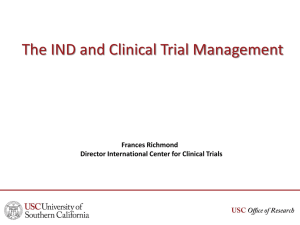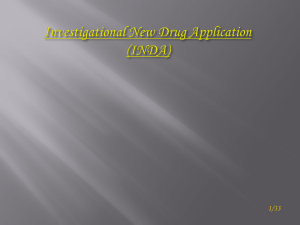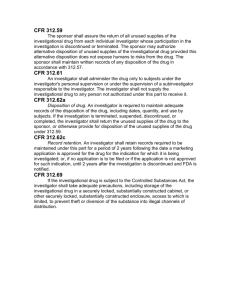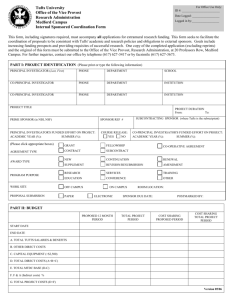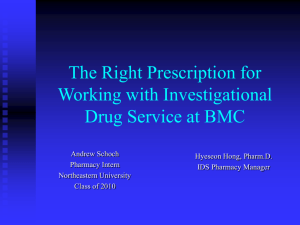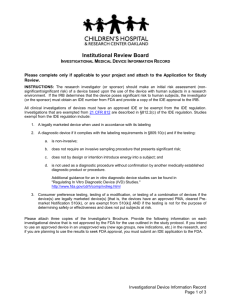Investigational Drug and Drug Accountability Guidance
advertisement
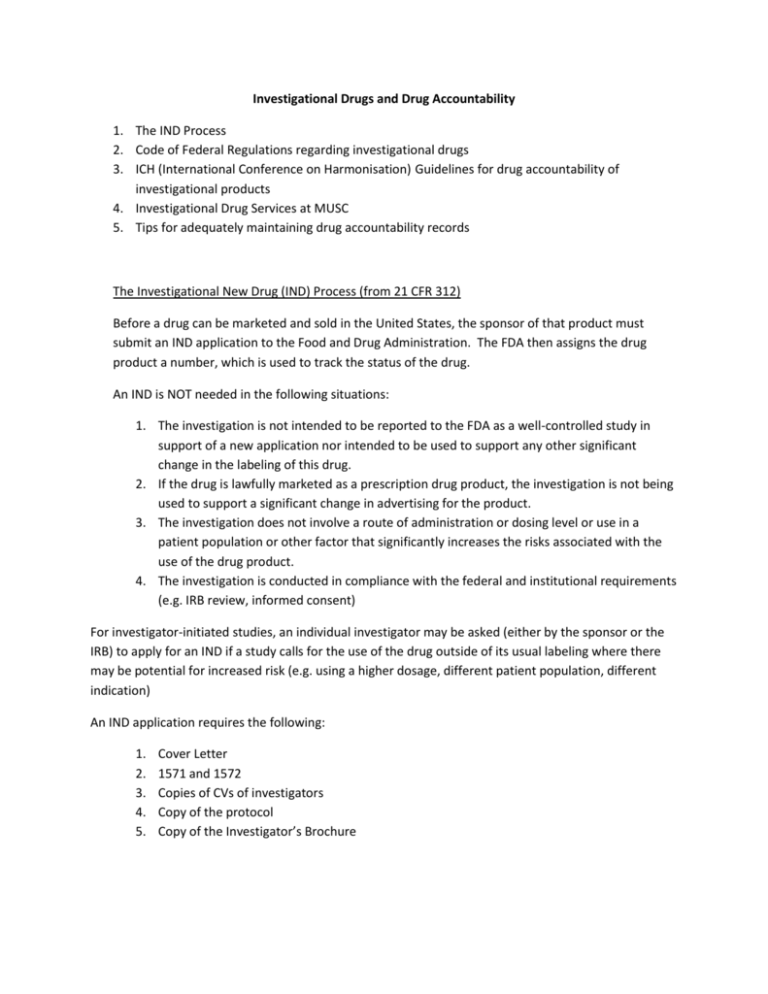
Investigational Drugs and Drug Accountability 1. The IND Process 2. Code of Federal Regulations regarding investigational drugs 3. ICH (International Conference on Harmonisation) Guidelines for drug accountability of investigational products 4. Investigational Drug Services at MUSC 5. Tips for adequately maintaining drug accountability records The Investigational New Drug (IND) Process (from 21 CFR 312) Before a drug can be marketed and sold in the United States, the sponsor of that product must submit an IND application to the Food and Drug Administration. The FDA then assigns the drug product a number, which is used to track the status of the drug. An IND is NOT needed in the following situations: 1. The investigation is not intended to be reported to the FDA as a well-controlled study in support of a new application nor intended to be used to support any other significant change in the labeling of this drug. 2. If the drug is lawfully marketed as a prescription drug product, the investigation is not being used to support a significant change in advertising for the product. 3. The investigation does not involve a route of administration or dosing level or use in a patient population or other factor that significantly increases the risks associated with the use of the drug product. 4. The investigation is conducted in compliance with the federal and institutional requirements (e.g. IRB review, informed consent) For investigator-initiated studies, an individual investigator may be asked (either by the sponsor or the IRB) to apply for an IND if a study calls for the use of the drug outside of its usual labeling where there may be potential for increased risk (e.g. using a higher dosage, different patient population, different indication) An IND application requires the following: 1. 2. 3. 4. 5. Cover Letter 1571 and 1572 Copies of CVs of investigators Copy of the protocol Copy of the Investigator’s Brochure The FDA has 30 days to respond to your request for an IND. If the FDA thinks an IND is required, they will provide the investigator with an IND number. If the FDA does not think an IND is required, they do not accept the application. Investigational Drugs (21 CFR 312) Labeling: The immediate package of an investigational product intended for human use must bear a label with the statement: “Caution: New Drug—Limited by Federal (or United States) law to Investigational use.” Marketing: A sponsor or its representative (e.g. Drug Rep) is not allowed to represent in a promotional context that the investigational product is safe or effective for the purposes for which it is under investigation. Charging: Charging for an investigational drug in a clinical trial under an IND is not permitted without the prior written approval of FDA. Investigator Responsibilities: The investigator is required to maintain adequate records of the disposition of the drug, including dates, quantity and use by subjects. If the investigation is terminated, the investigator shall return the unused samples or otherwise dispose of them under the direction of the sponsor. ICH Guidelines for Accountability of Investigational Products (ICH 4.6) 1. Responsibility for investigational product(s) accountability at the trial site rests with the investigator/institution. 2. Where allowed/required, the investigator/institution may/should assign some or all of the investigator’s/institution’s duties for investigational product(s) accountability at the trial site to an appropriate pharmacist or another appropriate individual who is under the supervision of the investigator/institution. 3. The individual designated by the investigator/institution should maintain records of the product’s delivery to the trial site, the inventory at the site, the use by each subject, and the return to the sponsor or alternative disposition of unused product(s). These records should include dates, quantities, batch/serial numbers, expiration dates (if applicable), and the unique code numbers assigned to the investigational product(s) and trial subjects. Investigators should maintain records that document adequately that the subjects were provided the doses specified by the protocol and reconcile all investigational product(s) received from the sponsor. KEEP YOUR SHIPPING RECORDS!!! 4. The investigational product(s) should be stored as specified by the sponsor and in accordance with applicable regulatory requirements. 5. The investigator should ensure that the investigational product(s) are used only in accordance with the approved protocol. 6. The investigator, or a person designated by the investigator/institution, should explain the correct use of the investigational product(s) to each subject and should check, at intervals appropriate for the trial, that each subject is following the instructions properly. Investigational Drug Services (IDS) at MUSC: Contact Information: 792-9643; MUSC Pager: 11269 1. All inpatient medication trials MUST go through Investigational Drug Services (IDS). 2. For outpatient studies, it is up to the investigator whether the investigator wants to use IDS 3. If IDS is used, the investigator (or designee) should meet with IDS staff to go over the study requirements—It is helpful to bring the following: a. Copy of the protocol b. Copy of the IRB approval and informed consent(s) c. Drug accountability forms provided by the sponsor d. List of contact information 4. Requests for study drugs must come in the form of prescriptions, with one person per prescription—IDS can help develop these if required 5. Important to request medications as soon as you know they are needed—DON’T WAIT UNITL THE LAST MINUTE!! 6. For monitor visits, important to let IDS know as soon as you do when the monitor is coming—it is recommended to have the monitor schedule an appointment with IDS staff to review accountability records 7. Important to note that although IDS would be designated by the investigator to dispense and maintain records of study medications, the investigator is ULTIMATELY responsible 8. Someone from IDS is on call 24/7 to handle issues that arise. Drug Accountability/Dispensing Tips: 1. 2. 3. 4. 5. 6. 7. 8. 9. 10. Keep all packing slips! Review accuracy of packing slips—let sponsor know if accurate Review shipping for damaged drug/packaging Periodically review inventory—check for expiration dates, make sure you have enough drug kits or dosage levels to complete the trial for the next several months Count returned medications while the participant is still there so that you can question participant about discrepant information Store study medication in a secure location Instruct participant to return all unused drug and packaging at each visit Make sure study medication is labeled such that you know whose medication is whose Make sure participant knows both brand and generic name of investigational drug (if applicable) Use a pill counting tray to count meds and try not to touch medication (if applicable) 11. Report lost or stolen medication to sponsor immediately—the sponsor may ask participant to file a police report! 12. Document dispensing medication the day it is dispensed 13. Have a double check system where someone else has to check that you are giving the right medication to the right person 14. Often easier to prepare medication before the participant arrives 15. Develop your own drug accountability forms if you don’t like the ones the sponsor uses (although you may be required to fill out both!) 16. Controlled substances have different rules! Make sure you understand them! Internal audit will review records of controlled substances semi-annually. Place where meds are kept must be inspected by DHEC.
